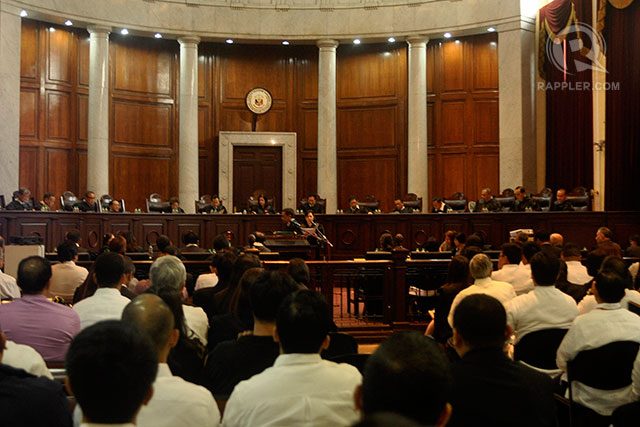SUMMARY
This is AI generated summarization, which may have errors. For context, always refer to the full article.

MANILA, Philippines – The Supreme Court junked on Tuesday, June 16, a petition to nullify an executive order that bans “midnight appointments”.
According to SC spokesperson Theodore Te, the SC en banc voted 8-6 to dismiss the petition that questions Executive Order 2, which recalled and revoked some of the 800 appointments made by former president Gloria Macapagal-Arroyo that fall within the appointment ban set for the May 2010 elections.
EO 2 was issued by President Benigno Aquino III in August 2011.
The petitioners are among Arroyo’s midnight appointees in 2010:
- Cheloy Velicaria-Garafil, who took her oath on March 22 as State Solicitor II at the Office of the Solicitor General
- Dindo Venturanza, who took his oath as city prosecutor of Quezon City on March 15
- Irma Villanueva, who took her oath on April 13 as Administrator for Visayas of the Board of Administrators of the Cooperative Development Authority
- Francisca Rosqueta, who took her oath as Commissioner of the National Commission of Indigenous Peoples on March 18
- Edie Tamondong, who took his oath on March 25 as member of the Board of Directors of the Subic Bay Metropolitan Authority
They are considered midnight appointments because they were made during the appointment ban. For the May 2010 elections, March 10 was the cut-off date for legitimate appointments.
A Philippine president is barred from making any appointments two months before the May elections and until he/she finishes his/her term on June 30.
“[The petitioners] cannot prove with certainty that their appointment papers have indeed been issued before the period covered by the appointment ban. On the other hand, the petitioners admit that they took their oath of office during the period covered by the appointment ban. In light of these facts, there is no need for the Court to rule on the constitutionality of Executive Order No. 2,” the SC said.
The High Court added that an appointment will be considered valid if it satisfies the following elements:
- the president signed appointment papers to a vacant office and officially issued them
- the appointee accepted the appointment, evidenced by his or her oath of office or assumption of duties
In 2012, a similar petition was brought to the Court of Appeals, wherein 6 midnight appointees questioned the constitutionality of EO2. The appellate court ruled against the petition. – Rappler.com
Add a comment
How does this make you feel?
There are no comments yet. Add your comment to start the conversation.